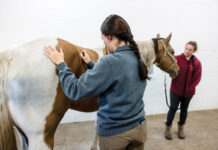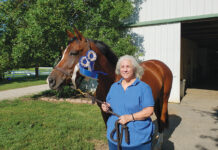Editor’s Note: Horse Illustrated is introducing a new column for 2015. Stable Advice is a place for our readers to offer their advice on some of those uniquely equestrian problems. These aren’t the questions that you’d normally ask your vet or trainer. These are questions about horse life, like dealing with interpersonal struggles at the barn, juggling horse commitments and “real world” obligations, and generally navigating the challenges of living in the 21st-century horse world. Think of this as a place to share advice with a group of your best equestrian friends.

This month’s Stable Advice question:
I recently bought a horse and keep her at a boarding stable. The stable owner is very experienced and knowledgeable, but I don’t always agree with how she does things. For example, I think she’s feeding my horse way too much grain. How can I approach her with this and other concerns when I’m much younger and less experienced with horses than she is?
Have you been through this? Have any advice for this reader? Click
“Submit a Comment” below to share it. Some of the best responses will be
featured in a future issue of Horse Illustrated!
This month, Noble Outfitters
is sponsoring the Rider Insider column in Horse Illustrated with a
prize for the selected featured response. If you’d like to be considered
for a prize, make sure to include your contact info in the email field
of the comment form (emails will not be publicly displayed.)
See all Stable Advice questions >>







good advice
Your horse is YOUR horse, and that means the final decision on her care is always up to you. If your request is something that the boarding stable can do (and less feed certainly falls into that category) they should accommodate you. That being said, since you acknowledge that the barn owner is an experienced horsewoman, she probably has a good reason for doing things the way she does. I’d approach it as a potential learning experience. Ask her to explain how she formulates the feeding plan. If it turns out that she hasn’t given it a lot of thought, that would be the time to tell her you’d like your horse to have less grain. But give her the benefit of the doubt first.
Hm
I agree with Martha. She’s your horse so you have to make the decision. But if you’re unsure find out why she’s giving her the amount of grain she is before making your decision.
I personally think most horses do not need grain.
If the owner does not want to talk to her, one on one, perhaps, she could have her vet talk and explain about too much grain in the diet.
I’d tell her I want to learn more about horse-keeping and ask her how she determines how much grain to feed each horse, then discuss the specifics of your horse. Based on her answer, you may agree with her decision. If not, tell her your concern and ask her to adjust the feeding for a trial period so you both can evaluate. Remember, she trying to be helpful and considerate by ensuring your horse has plenty to eat.
I agree with both Claire and Martha if feel like you don’t have enough experience ask your vet and have the manager explain why she feeds the way she feeds owning horses is always a learning experience
If I were you, I would go up to her and ask politely why she does things a certain way. For example, if you wanted to confront her about the amount of grain she is giving, you could just walk up to her and say “I don’t know how much grain my horse needs, but that looks like a lot that you are feeding my horse. Could you tell me why you feed that amount?”. Of course, don’t sound like a demanding know it all when it comes to talking to her, but act genuinely interested in hearing her reasoning of why she does things her way. You might even get some really good horsey advice from her that you can use in the future! Most people are happy to help the younger generation of horse lovers grow in their knowledge as long as they are ready to learn!
It’s a careful balance. The owner’s job is, ultimately, to care for your horse, which means she has to know what she’s doing. You pay her to do this, which means that she works for you. That means that you have to take the responsibility in making sure she is doing her job. If you feel she isn’t feeding your horse correctly, go and find out from as many sources as possible everything to do with feeding horses. Once you’ve done that, write down exactly why you have a problem with the way your horse is being fed and what needs to change. Then you can go to her, ask her why she feeds the way does, and tell her the reasons why you’d like to feed differently.
From my experience, if you’re able to give clear knowledgeable reasons, most owners don’t have a problem working out any problem you may have.
why do you think she is feeding her too much grain? Have you had horses before and do you know what she was being fed where you bought her from? I am a farm manager and I usually go over the feed program with new boarders before the horse even comes and I usually ask what the horse was previously on and at what amount to stay consistent. I also ask about the turnout/exercise program the horse was on.
I’d venture to guess she is feeding that volume intentionally for the health of your horse. Ask her why she feeds that feed and that amount as a learning experience. I disagree with those advising involving a vet. Every horse is different, every property is different, and then there are further changes at various times of the year like more or less grass and lesser-quality hay. Unless the vet knows horse, the property and feed program backwards and forwards then he/she is only guessing or going off a standard that may be inappropriate for that horse at that property.
I own and run a full service horse ranch that does boarding. I discuss with the owner about the feeding regimen before the horse arrives, discuss any supplements and any issues (ulcers, recurrent colic, etc). I weight tape every horse when they come in, and continue to tape every month. If I feel a horse is gaining or losing, I will adjust feed. If it gets to a point past what I am comfortable raising feed to, I will address it with the owner.
Even though you are younger and less experienced than the stable owner, the final decision in how your horse will be cared for is up to you. However the decision as to the services offered is up to the stable owner. You did not say in your question whether your horse is fed individually or in a herd. You also didn’t state why you feel your horse is getting too much grain. There are many reasons to feed less grain- is your horse putting on unwanted weight? Do you feel your horse is getting to rowdy due to the amount of grain? Is your horse older, and you are concerned about insulin resistance? If you have concrete concerns about your horse and he is fed individually, the stable owner would probably feed him less with no problem. If it is a matter simply of personal preference, your stable owner may change the feeding, but you may have to pay a fee for the special service. If your horse is fed as part of a herd, he will have to be brought up and fed separately, which will entail more work, more time, and added facilities so this will definitely cost you if the owner offers this service. The thing to remember is that if your stable owner is knowledgeable she is feeding an amount that has worked out well for her in the past. And if she is experienced, she knows that every horse is an individual, and what works for most will not work for all. As long as you keep your concerns limited to your own horse and not her way of doing things in general, she should be open to any concerns you have.
Most of my comments have already been stated, but to reiterate, If you have a good relationship with your barn/stable manager, start a dialogue, first and foremost… Ask why is my horse getting so much grain! there are so many contributing factors, it can get a little nutty… for instance, Is the horse being worked daily, or just once a week? Is the horse an “easy” keeper? Does the horse have other health issues (ulcers, nervous habits, bad teeth, etc) ? How old is the horse… To answer your question, Just ask! If the manager has a problem or gets pissy about you being concerned for your horse welfare, and trying to increase your own knowledge of how to care for your animal, then you probably need to find a different stable…
Do your homework….hay first,or a hay replacement pellet. Grain is not a good option for a non working horse ( light work counts as non working) unless it is being used modestly to feed supplements. We have boarded others horses and ironically, several were concerned because they thought we were not feeding enough grain. When I explained and backed it up with information they could check out…we were able to work together to find the best balance for their horse.
Since you have less experience than your barn owner, I would seek the advice of either your vet or another boarder. Being a barn manager for the last 3 years, if a boarder wishes to change their horse’s routine, politeness is always appreciated. Perhaps give her an explanation or reason why you think the amount she is currently being fed is too much. As long as you are polite I don’t see why the owner would not honor your request. In the end, this is your horse and you are the owner.
I would let the owner of the boarding facility know that you are interested in learning how and what to feed horses. Ask questions on how does she go about determining how much to feed and what to feed different horses. Being a well educated and informed horse owner makes for a good horse owner. If the owner of the boarding facility truly loves and enjoys her career he/she will be more than happy to share their knowledge with you. When this is all said and done and if your still concerned about how much your horse is being fed, I would ask if they would mind if you have a feed expert from which ever feed they use to come and analyze your horse to see what they have to say and why. If still not satisfied I would have a vet come out to give my horse a once over and see what he/she has to say. In the end I would go with what the vet and feed expert has to say about your horse and its nutritional needs due to its current work load. Thank the barn owner for being patient and understanding with you and your concerns. Just let them know that you just want to learn and do what’s best for your horse.
I would let the owner of the boarding facility know that you are interested in learning how and what to feed horses. Ask questions on how does she go about determining how much to feed and what to feed different horses. Being a well educated and informed horse owner makes for a good horse owner. If the owner of the boarding facility truly loves and enjoys her career he/she will be more than happy to share their knowledge with you. When this is all said and done and if your still concerned about how much your horse is being fed, I would ask if they would mind if you have a feed expert from which ever feed they use to come and analyze your horse to see what they have to say and why. If still not satisfied I would have a vet come out to give my horse a once over and see what he/she has to say. In the end I would go with what the vet and feed expert has to say about your horse and its nutritional needs due to its current work load. Thank the barn owner for being patient and understanding with you and your concerns. Just let them know that you just want to learn and do what’s best for your horse.
Just say “I would like his grain cut and hay increased until I increase his work” no need to say more. If she argues, just say “I hear what you are saying but I would like to try (give ammount) for a month and then we can discuss making more changes. I have found that many barns prefer to feed too much grain rather than more hay. Grain is easier to deal with and come by than hay.You pay the board, she works for you.
Speak up, but politeness and respect are vital! I would read up on horse nutrition and then approach the stable manager first by asking questions, such as “How do you decide how much grain to feed my horse?” “Do you think my horse would do better with a little less grain?” etc. Then, be listen to what your barn manager has to say. It may be that after listening to her explaination you will find you agree with her. If you still disagree, make sure you stay respectful and don’t argue. Get a second opinion from a vet or another knowledgeable horse professional and make any needed adjustments. Most good barn managers will understand that you are just trying to do what is best for your horse.
In the case of your concern about the grain, I would first try to talk to the barn manager casually about how she makes horse-feeding decisions so you can better understand her point of view. Then gathering equine nutrition information from reputable sources such as your veterinarian might help put your fears to rest. Tactfully explain your concerns about why you think this person is feeding too much grain and how you think it might affect your horse’s health and behavior. If after talking with other experts you still feel your horse’s care is being compromised, you can either talk with the barn manager directly about your concerns and/or explore other boarding options that might more closely match your horse-keeping philosophy. If you approach each of your concerns in this manner, you might find that many of your worries will have been laid to rest and that you have learned a great deal of information along the way. Keep in mind too that even experienced, thoughtful horse-people will have differing opinions on what might be right for a particular horse in a particular circumstance. In the end though as the owner of your horse, you have to decide where you think your horse will be happiest and healthiest. If you continue to be uncomfortable with your horses care after increasing your knowledge base, it might be time to move on.
you could get a second opiion
ask your vet next time he checks up your horse how much you should be feeding him. then make that his grain ration.
Is your horse too fat or too hot? If not, then you may need to simply consult your trainer and have a one-on-one talk, and find out exactly why your horse is getting that much. If your horse is fat, hot, or even out of sorts, then it may be best to research. Find an equine nutritionist or a vet and explore options, and get them to check your horse. If your trainer will not allow this, it might be time to move or change barns or trainers. Once you have a plan and know a few options, then talk to your trainer. Perhaps she will request a talk with the vet as well. Remember though, get evidence to back up your opinion!
Try this, next time you see your trainer, ask her why she thinks this is a good amount of grain for your mare. When she gives an explanation, take a moment to think about her answer: Does her explanation make you agree with her? If not, ask your vet to come out and check your horse, If she is overweight, ask the owner if they could cut back a little on your mare’s grain. Be respectful about it though! If she says no and that your horse is just naturally fat, or some other excuse, then it’s time to find another stable. but if she says that all right, just keep on keeping your mare happy and healthy!